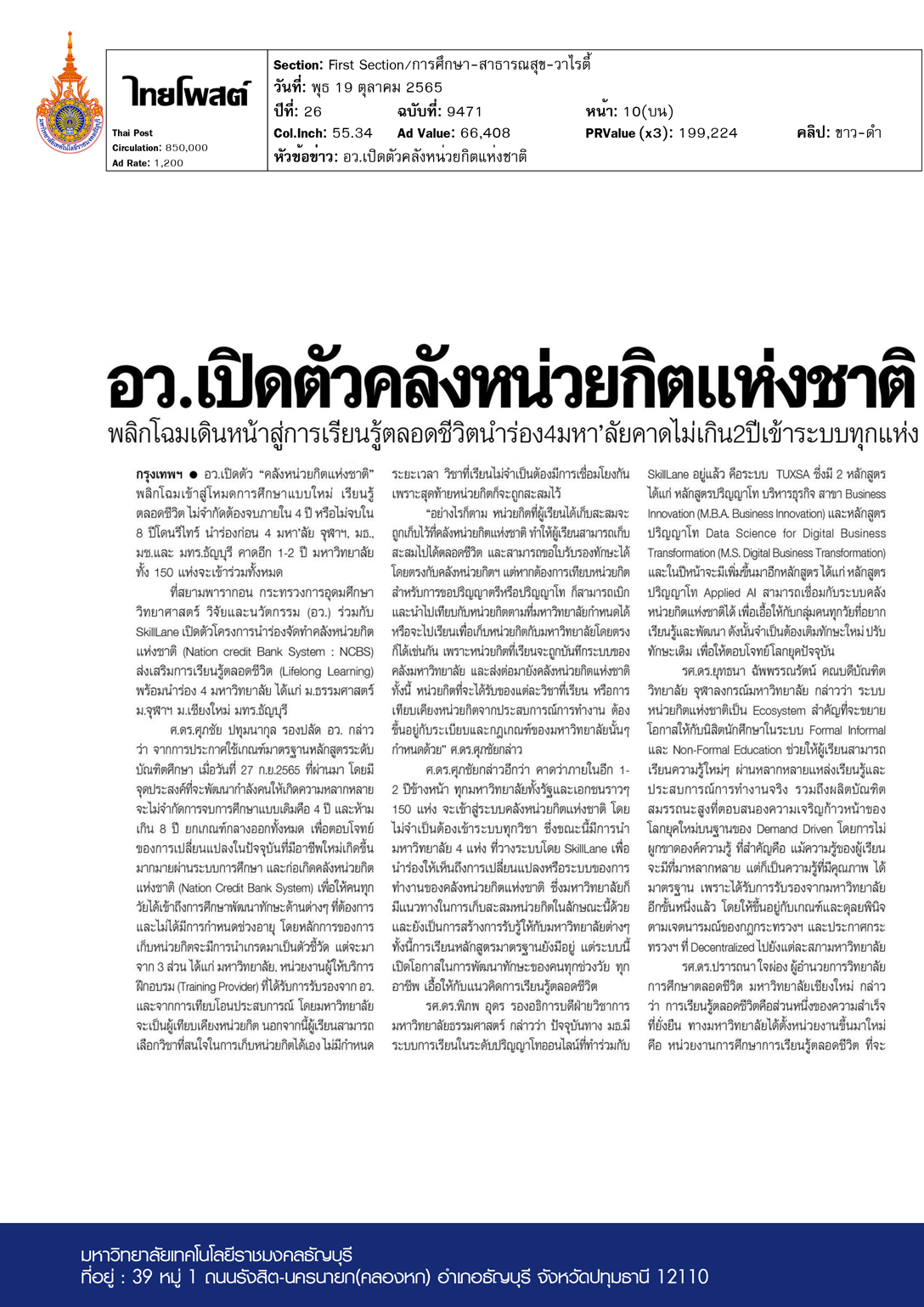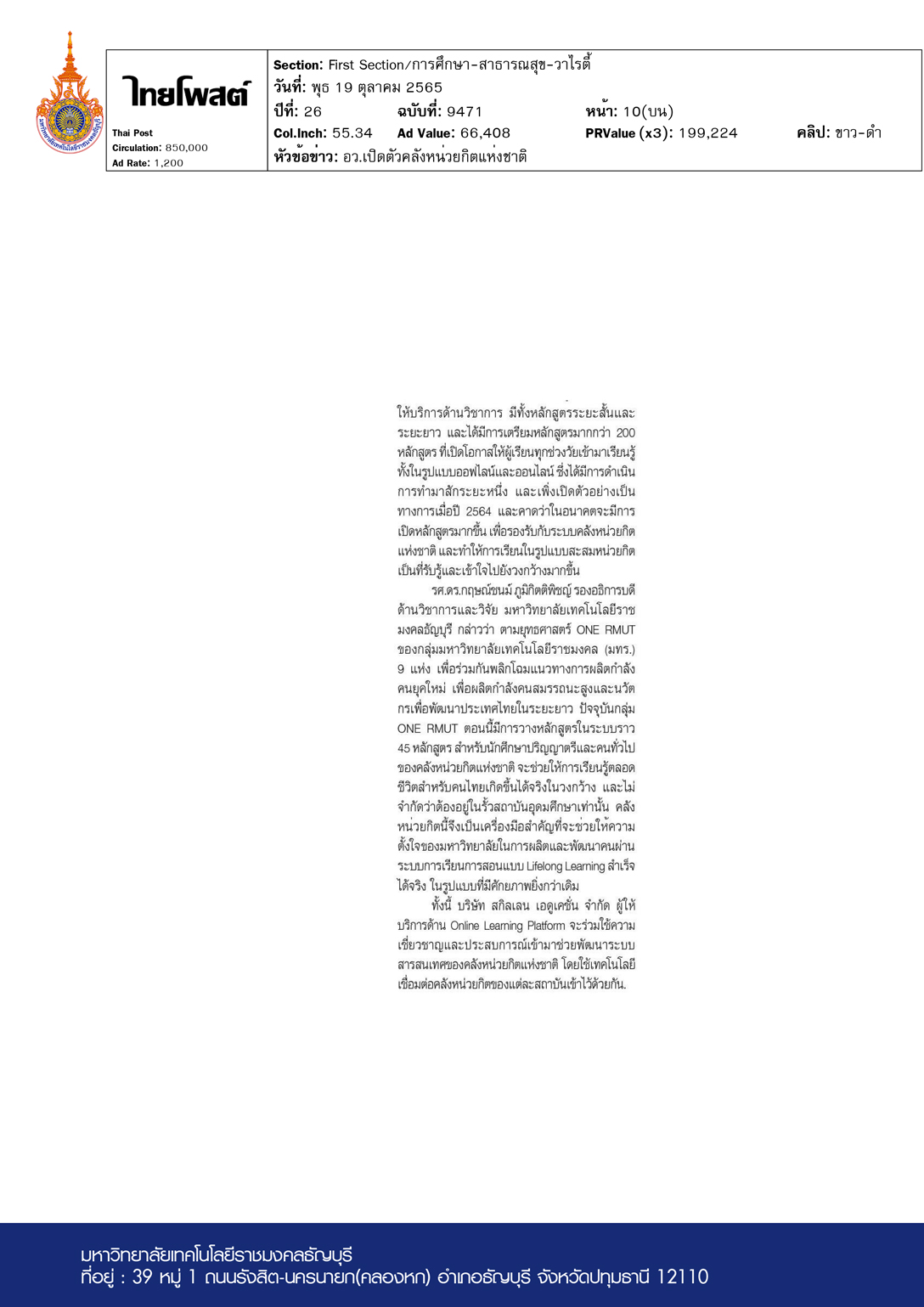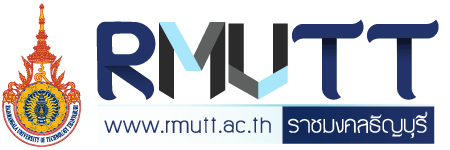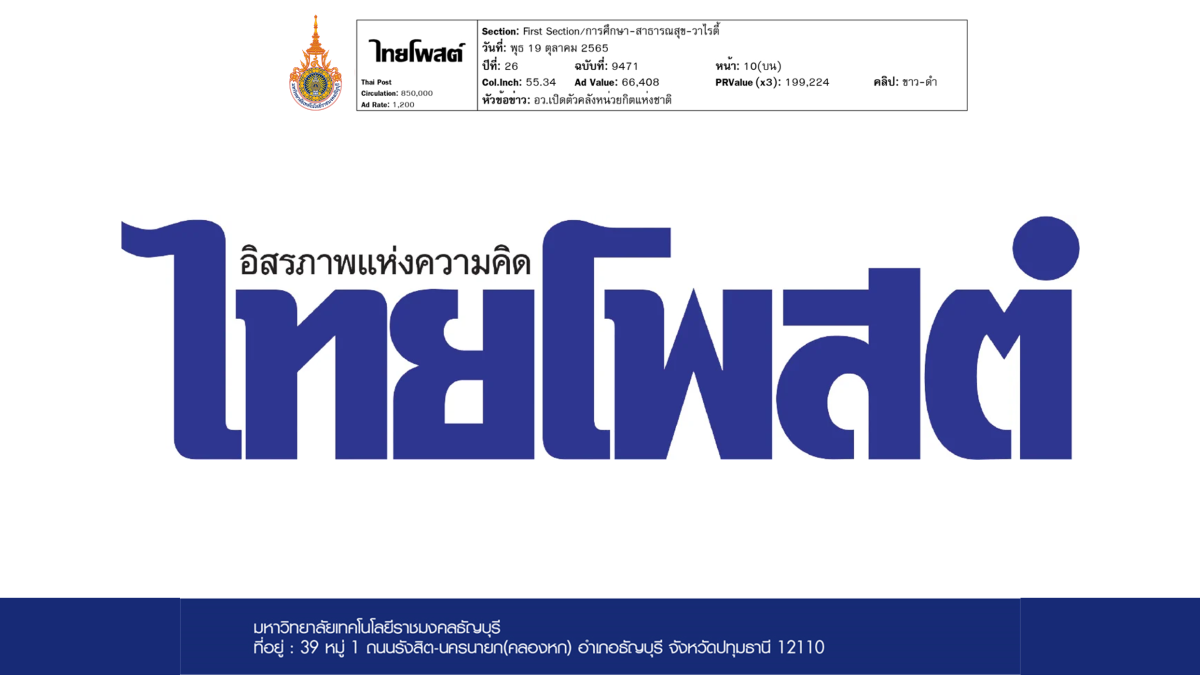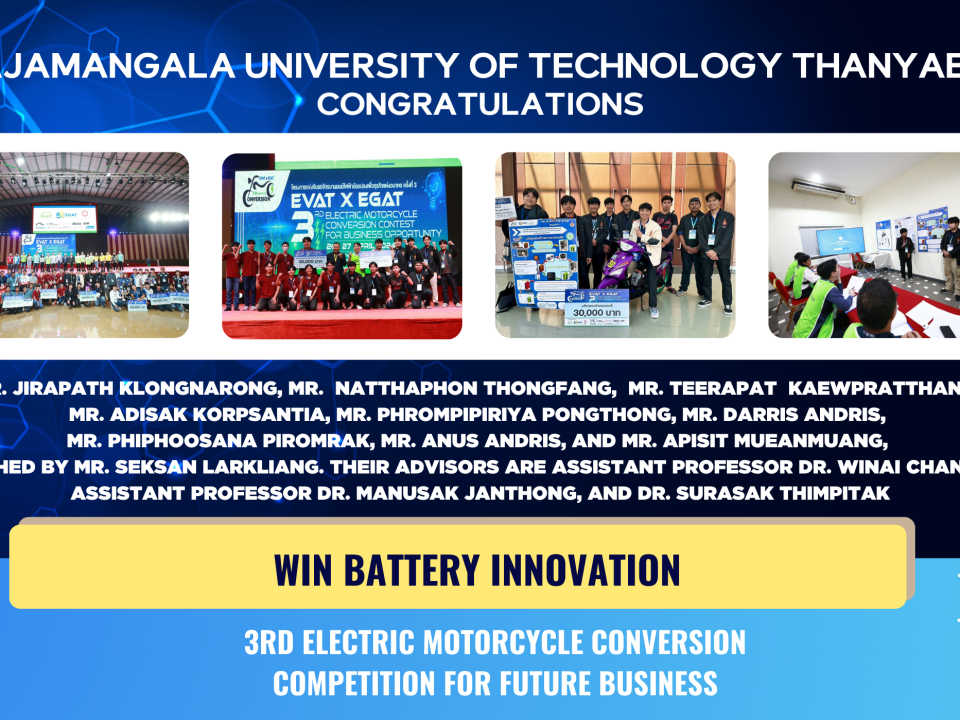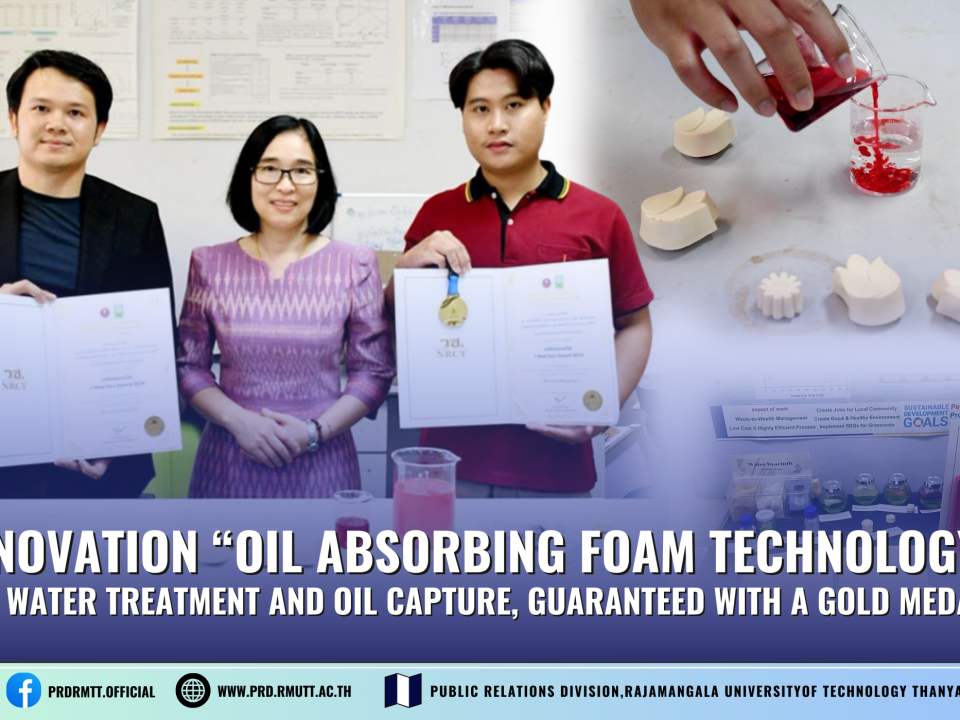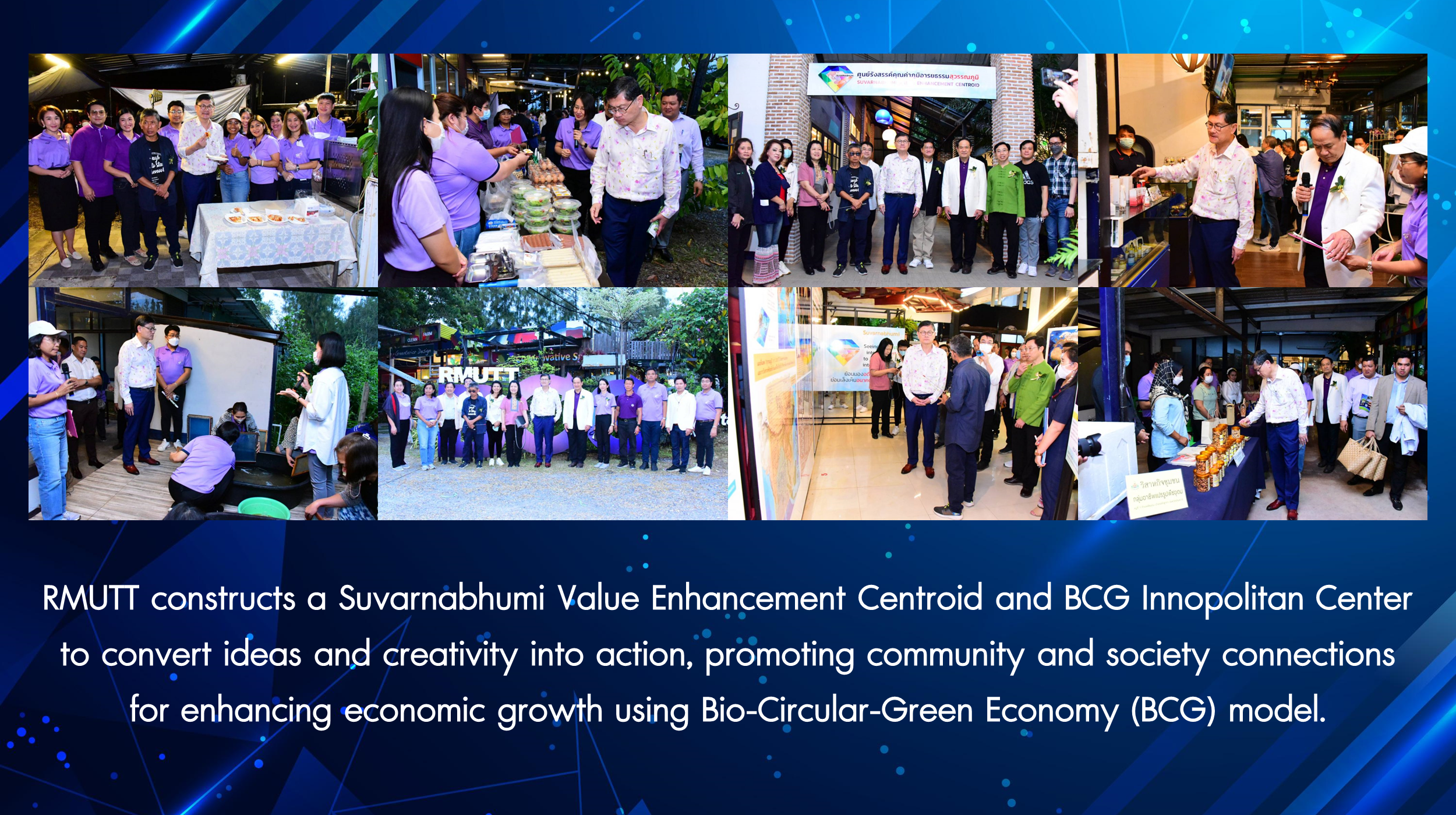
RMUTT constructs a Knowledge Exchange Center for ‘Economy, Community, and Social improvement’ with BCG model
17/10/2022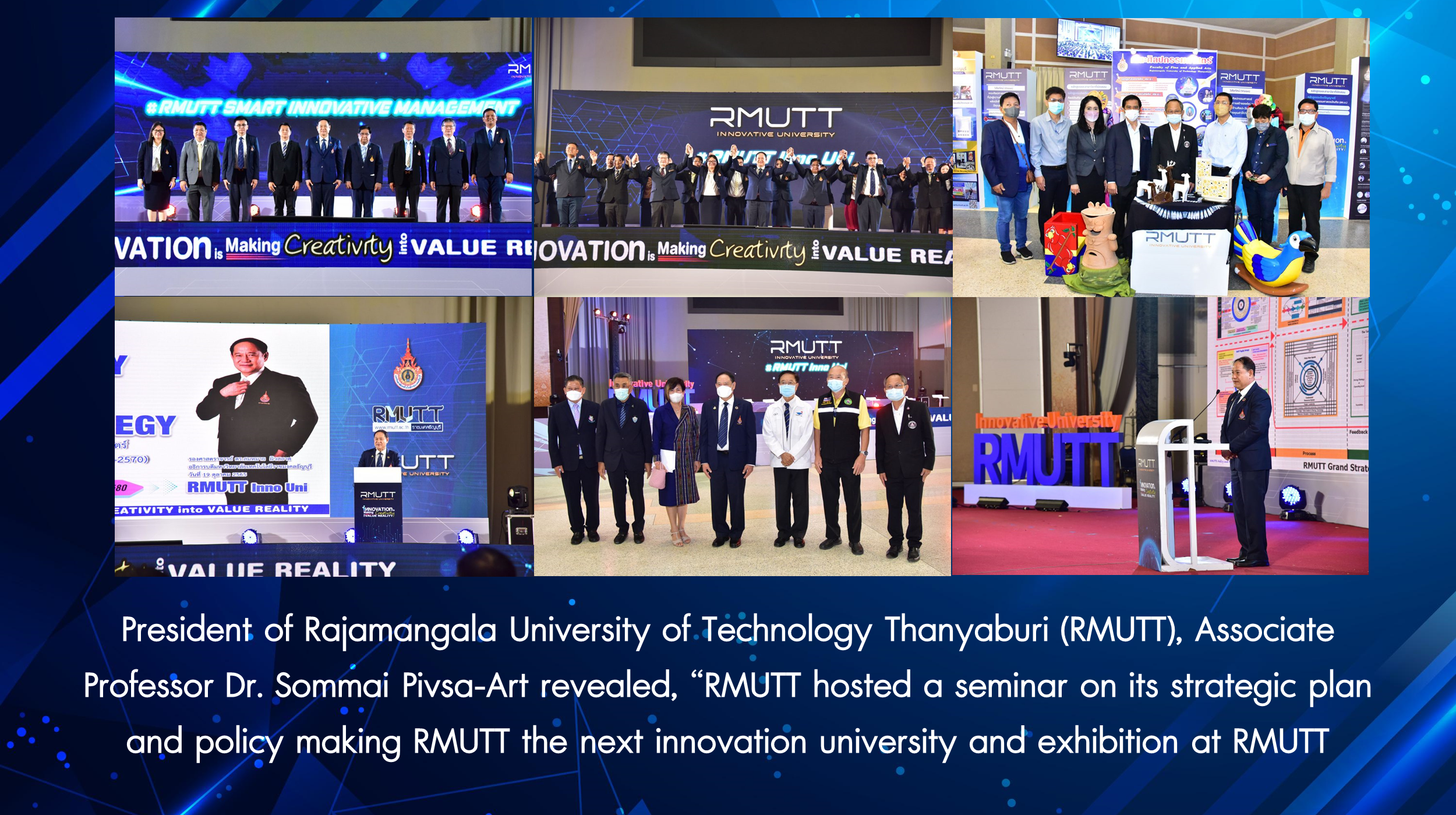
‘Sommai’ keeps pushing forward its ‘Innovative University’ policy
19/10/2022Thai Post News: Published on October 19, 2022
This ‘Lifelong Learning’ pilot program is planned to kick off within 2 years with four leading Bangkok-based universities.
At Siam Paragon department store, Ministry of Higher Education, Science, Research, and Innovation (MHESI) introduces new credit accumulation system for life-long learning program. Learners do not require to earn their bachelor which is roughly equivalent to four to eight years of work without dropping out. Chulalongkorn University (CU), Thammsat University (TU), Chiang Mai University (CMU) and Rajamangala University of Technology Thanyaburi (RMUTT) will start off the pilot program. Assumably in a couple of years, there will be more than 150 universities nationwide participating the program.
Ministry of Higher Education, Science, Research, and Innovation (MHESI) in partnership with Skilllane announced to launch the new National Credit Bank System (NCBS) to promote lifelong learning. The pilot program was joined by four leading universities including Thammsat University (TU), Chulalongkorn University (CU), Chiang Mai University (CMU), and Rajamangala University of Technology Thanyaburi (RMUTT).
Prof. Dr. Supachai Patumnakul, Deputy Permanent Secretary of The Minister of Higher Education, Science, Research, and Innovation (MHESI), said: “On September 27, 2022, MHESI announced the new Graduate Program Standard Criteria with the aim of giving chance for Thais of all ages so they could access new learning methods at any time under the National Credit Bank System (NCBS). Through the system, learners manage to accumulate their credits that come from three sources including university, MHESI certified training provider, and work experiences. University will be responsible for storing earned credits in academic bank of credit. Besides, learners could turn their learning outcome from any of their elective courses into credits given unlimited time for storing those credits in the credit bank.
“Learners could store their learning outcomes in the national credit bank, which promotes lifelong learning and they would also be able to acquire a cumulative learning outcome report directly from the National Credit Bank. Using sufficient credits at the Bank, learners can apply for an undergraduate or master degree program and while studying in the program, learners can also continue storing their learning outcomes in the system and transferred them into the national credit bank. However, university will only accept the transfer credits learners have completed that meet requirements of a degree,” revealed Prof. Dr. Supachai.
Prof. Dr. Supachai gave us his final thought on the issue, “Collaborating with Skillane, within two years, of more than 150 universities from both public and private will be participating in the project and currently, there are four leading universities who already joined the program. We hope that this pilot project will be expanded to various universities to help create learning opportunities for Thai people of all ages.”
Assoc. Prof. Dr. Pipo Udorn, Vice President for Academic Affairs, Thammasat University, said: “Our university has already been working with Skill Lane to create an online education system platform known as, “TUXSA” for two graduate programs including ‘M.B.A. Business Innovation’ and Data Science for Digital Business Transformation (M.S. Digital Business Transformation) and hopefully next year, there will be another graduate program, called ‘Applied AI’ which credits could also be transferred to the National Credit Bank System. This could help Thammasat university promote Upskill and Reskill for people of all generation and that is our primary goal.
Assoc. Prof Dr. Yootthana Chuppunnarat, President of Chulalongkorn University Graduate School, said: “The NCBS is a crucial ecosystem that expand opportunities for learners in formal and non-formal education, allowing learners to acquire knowledge through several learning sources and real work experiences and producing well-qualified graduates that meet the growth and demands of the demand-driven, modern world. Regardless of how knowledge of learners come from different sources, if it is well-qualified and standardized, the learner outcomes could be certified by the university which measures the criteria and discretion according to the ambition of Ministerial Regulation and the Ministry’s announcement decentralized to each university council”.
Assoc. Prof. Dr. Pradthana Jaipong, Director of School of Lifelong Education, Chiang Mai University, said; “Lifelong learning is a part of sustainable success in life. Chaing Mai University is aspired to create a sustainable Lifelong Learning culture in Thai society. The university serves learners with more than 200 certified short and long courses both online and onsite. We officially established our courses connected to the National Credit Bank System in 2021 and hope there will be more to come in the future.”
Associate Professor Dr. Krischonme Bhumkittipich, Vice President for Academic and Research of Rajamangala University of Technology Thanyaburi (RMUTT), said: “In align with ‘One RMUT’ strategic plan collaborative established by the 9 RMUTs, all RMUTs aim to propose plan to optimize graduate’s competency manpower and their innovation creativity in long-run. Overall, there are 45 programs in the 9RMUT courses available for undergraduate and graduate program. RMUTs truly believe that the emergence of the National Credit Bank will enable Lifelong Learning for Thai people in a wide range beyond the higher educational institutions. Therefore, this credit bank is an essential tool that will help the institutions achieve people development through the lifelong learning system.”
SkillLane Education Co, Ltd, is an online learning platform that provide expertise and experience to help develop the National Credit Bank System using technology to link each institution’s credit bank into one.
